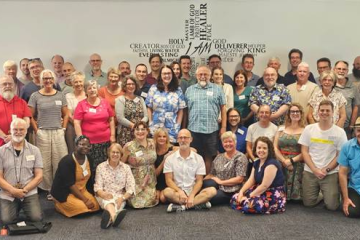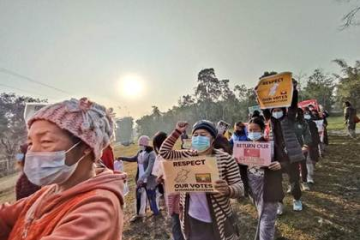Crumbs! – Mark 7:24-30, Isaiah 35:4-7
There are some passages of Scripture that you read and think – quite literally, Crumbs! What are we to make of this? Did Jesus just call that woman a dog? How did she find a way to respond to that? And what are the implications of Jesus’ reply for the coming of the kingdom of God into our lives and into our world? And, you might also be asking, why are we looking at this passage on Father’s Day?
Commentators try to get Jesus off the hook for what he says here, in a range of ways, to soften the offence of his words. Martin Luther wrote that, “’Dog’ here signifies a little dog,” and that Jesus uses this term to speak somewhat apologetically. William Barclay agrees, adding that tone of voice makes all the difference; that the Syrophoenician woman, “saw at once that Jesus was speaking with a smile.” Others suggest that this was a test of her faith. And yet others point to Jesus’ humanness, his physical exhaustion that is indicated in the text at this point in his ministry. Finally, there are those who emphasise that Jesus was appealing to the limits of his mission, that his call was to serve his own people. In Matthew’s version of this story, Jesus begins by saying, “I was sent only to the lost sheep of the house of Israel” (Matthew 15:24).
These are all genuine attempts to understand what Jesus is saying here, but, keeping in mind that this is a text from an ancient patriarchal culture, we should not be surprised to find ethnic tensions in it and problematic gender dynamics. American theologian Ched Myers writes, this woman’s “solicitation is an affront to the honour status of Jesus: no woman, and especially a gentile, unknown and unrelated to this Jew, would have dared to invade his privacy at home to seek a favour.” She is the wrong gender, the wrong ethnicity – the writer of Mark adds this detail later to heighten the drama – and she is in the wrong place at the wrong time.
So, it is less remarkable then what Jesus says to her.
Far more remarkable is that she speaks to him!
This year we have been made aware of the ongoing challenges that women experience in having their voices heard, even in 21st century Australia. We have had sexual assault survivor Grace Tame appointed Australian of the Year and heard her story, as well as the rape allegations of Brittany Higgins, and there have been several books and articles and programmes. I am thinking of Annabel Crabb’s Ms Represented and this week’s 4-part report on the 7:30 Report, Why are Women Angry? That report concluded that thanks to a combination of economics and discrimination and violence against women, female disadvantage is still firmly entrenched in Australia.
One of the most wonderful – and unscripted – sequences in Ms Represented shows a whole series of female politicians – Julie Bishop, Linda Burnie, Bronwyn Bishop, Ros Kelly, Sarah Hansen-Young, Margaret Reynolds, Penny Wong, Julia Banks and Anne Aly – all telling the same story; of being in room with men, of expressing an idea, of it going nowhere (“You think, Oh, OK, that was a dud!” says Sarah Hansen-Young.) but then the idea is said again by a man and, suddenly, it’s a great idea!
Julia Gillard and Ngozi Okonjo-Iweala also identify this, in their book Women in Leadership, in a study of a biotech company which found that ideas put forward by highly qualified female scientists were ignored until restated by a man. They also found that women’s contributions, unless perfect, were rejected, “whereas if a man put forward a flawed position the best bits would get salvaged.” Women spoke much less in meetings as a result.
The book refers to another study conducted on groups of five people of ‘talking time’ (the amount of time people are given to talk). It isn’t until four women and one man were in the group of five that talking time was equally shared. In that setting only 20% of interruptions when a woman was speaking were negative, whereas for one woman in a group of four men, 70% of the interruptions were negative. If you are worrying about what happened when there was one man in a group of four women, don’t! He still held his own.
What interests me is the impact this has on the church. Amy Shum, who works for the Baptist Association of NSW and ACT has written a paper on the experiences of ordained and accredited female ministers for women exploring the call to pastoral ministry. She interviews five female pastors and gives them pseudonyms: Priscilla, Deborah, Phoebe, Junia and Lydia. (You can guess where those names come from!) It is rather sobering reading. Junia had to leave her ministry role because an incoming senior pastor did not approve of female ministers and arranged for her replacement. Her accreditation service, which had been planned, was cancelled. Phoebe experienced anonymous complaints; people putting notes in the offering bag quoting the Timothy passage about women being silent. At another church, several families left when she became lead pastor. As an Associate Minister, Deborah supervised a male colleague who was uncomfortable with women in ministry. He and his wife left, along with two other families, when she was appointed senior pastor. Priscilla speaks of being on the ‘outer’ in all-male teams, the difficult ‘dynamics of working with the church leadership’, ‘being restrained’ in exercising her gifts, ‘sexism’, the ‘incredible expectations’, not being ‘able to lead completely freely’, and, eventually, ‘burnout’. No surprise then that this graph, of the numbers of men and women accredited since 1999 when the Association accrediting men and women together, shows that out of 246 accreditands, only 28 were women.
The Why women are angry? report this week also highlighted that while women from all walks of life experience financial disparity, discrimination and domestic violence, disadvantage is magnified for women who are already marginalised. Dr Emma Fulu, Executive Director of the Equality Institute, said, “We really need to question ourselves, when the stories that make us angry, have to come in the package of a young white woman and that is not at all to take anything away from the likes of Brittany Higgins or Grace Tame, whose courage and power has been…instrumental in …bringing to light these issues. But the reality is that women of colour, Aboriginal women, transwomen, face much higher rates of violence, face much more discrimination, and yet their voices are not elevated. In fact, they’re often silenced…. [We] need to question ourselves about why it is that we listen to certain voices, and we turn away from others?”
Which brings me back to the woman in the text; a Gentile, of Syrophoenician or Canaanite origin. In other words, a woman who was seen as implicitly unclean, a descendant of the ancient enemies of Israel, and also unclean by association with the spirit possessing her daughter. She is the marginalised of the marginalised and yet she will not be silenced.
Where then does her courage to speak to Jesus come from? Her courage to respond, “Sir, even the dogs under the table eat the children’s crumbs”?
I believe it comes from comes from the love she has for her daughter. A love that compels her to cross boundaries she never otherwise would have crossed. A love that compels her to enter places she never otherwise would have entered. A love that compels her to speak to Jesus, to beg Jesus, to beg that her daughter be freed from the evil that torments her.
And I also believe it comes from a deep-down sense that if God is any kind of God at all – God will hear us – God will know the justness of our cause – and God will answer; that the bread of life – even if it is just crumbs – is not the bread of life unless it is shared with all. As Ched Myers points out, this passage “prepares the way for the fulfillment of the Syrophoenician woman’s request – the feeding and satisfaction of the gentiles” which takes place in the next chapter, with the feeding of the 4,000.
This is the second remarkable thing that takes place in this passage.
Jesus hears her. He hears her and acknowledges the truth of what she is saying, that her vision of her vision of the breadth and length, the height of love and depth of compassion of the kingdom, goes beyond that of his in that moment, to the lost sheep of Israel; that her vision encompasses all who are lost, all who are hungry, all who seek God’s healing and wholeness.
Aron and I have a running joke, from a TV show we watched just after we were married, that what’s important is not just saying, “You are right,” but also saying, “I was wrong.” Jesus says, “You were right, and I was wrong. And your daughter is healed.”
This may raise Christological challenges for us, but in a world, in a church, where there is so much we need to stop and listen to, so much that we need to acknowledge that others have got right, and so much that we need to acknowledge we have got wrong, I believe it is an incredibly powerful testimony that Jesus was man enough to say that she was right, that he was wrong, to change his mind, to expand his vision. This is what being a Jesus man is all about.
Amy Shum’s paper relates Lydia’s story of being in a church where two families didn’t believe women should lead or preach. On the Sundays I preached, she says, the senior pastor would warn them, and they wouldn’t come. One family decided to leave the church, but the other one came one Sunday when the senior pastor forgot to tell them she was preaching, and they stayed. After that, she says, they never missed another Sunday. They just had to rethink their theology. They told her, “We heard what you had to say. And it was right. We came away thinking, ‘Why shouldn’t we listen to that? There was no heresy!’”
Deborah, too, speaks about her family supporting change. She says, my dad was one of the ones who went and voted to accredit women. And he went because I was just starting college at that stage. He said to me, “It’s not just for you, it’s for all women. We need to do this. It’s about time.”
And my own story is similar. I had a female teacher in my missionary school who was preparing to return to the US and enter seminary, and I was very disturbed by this. In the holidays, I went home and spoke to my dad who agreed that he didn’t think female pastors were biblical either, but he suggested we spend the holidays reading the New Testament and thinking it over together, and as we did this, we both concluded that God could pour out God’s spirit on men and women, that women could be gifted in preaching and teaching and leading, and it was not long after that I began to recognise my own call to ministry.
And so on this Father’s Day, I want to say thank you to my dad, not just for being a great dad, not just for having supported me and celebrated with me through the highs and lows of pastoral ministry, but also for having demonstrated to me that with God is the grace and the power to change, to accept that we are wrong, to embrace the ever expanding vision of the love of God and the Kingdom of God.
We need strong women, and we need strong men who respect strong women. We need women who are outspoken and men who will listen. We need men and women who can admit when they have got it wrong and work together to bring about God’s kingdom.
Because I don’t believe that women should continue to be grateful for the crumbs that fall from the church’s table or society’s table. Like the Gentile woman I will keep asking, I will keep begging, for a day when women receive the same encouragement and opportunities in ministry that men are given. I will keep asking God, begging God, for a day when women can lead without the monkey of meeting everyone’s expectations – am I seen as strong enough? am I seen as feminine enough? – on our backs; for a day when I might apply for a job where I am only slightly better qualified than the male candidate and get the job.
And we must all keep asking, keep begging, keep working to wind back female disadvantage, whether it is economic vulnerability for older women, or unpaid labour, or unequal pay, or bullying in the workplace, or discrimination, or violence, especially for the most marginalised.
Because we worship a God whose vision is bigger; whose vision is of hope and life flooding into areas that were dry and desolate; whose vision is of the weak and fearful being strengthened; whose vision is of those who were blind, now seeing, of those who were deaf, now hearing, of those who could not use the faculties and gifts they had, being able to do so, and to quote directly from Isaiah 35, whose vision is of, “the tongue of the speechless singing for joy.” This is the vision of God’s kingdom we are discovering as God’s people.
So, I am so glad that we have in this church so many dads who are prepared to take their children on adventures, because we are on an adventure; an adventure where women and men who can speak and listen to each other; an adventure where women and men who can admit they are wrong and change – as Jesus did – an adventure where women and men who can work together to discover the breadth and length and height and depth of the love and the kingdom of God.
To close, Aron is going to come and read a poem written by Brian Wren, ‘Jesus Man’.
Can a man be kind and caring?
Jesus was.
Can a man who’s kind and caring
be adventuresome and daring,
bravely doing right,
walking in the light?
Jesus did and so I can:
I will be a Jesus man.
Can a man be sad with crying?
Jesus was.
Can a man who’s sad with crying,
shed his tears, yet keep on trying,
loving to the end,
enemy and friend?
Jesus did and so I can:
I will be a Jesus man.
Can a man be hurt and broken?
Jesus was.
Can a man who’s hurt and broken
show his friends how God has spoken,
giving to us then,
power to start again?
Jesus did and so I can:
I will be a Jesus man.
Hallelujah! Hallelujah!
I will be a Jesus man.


